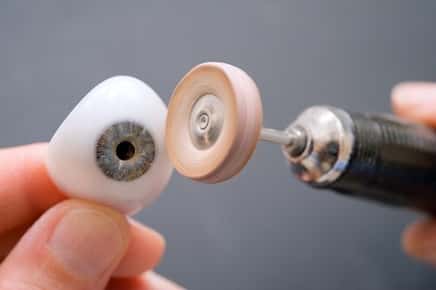
Prosthetic eyes may not be natural, but they still require regular care to remain comfortable and attractive. If you or a family member has a prosthetic eye or may need one in the future, you'll want to take a look at these frequently asked questions about prosthetic eyes and their care.
When Are Prosthetic Eyes Needed?
Prosthetic eyes are used to ensure that your appearance isn't affected after you lose an eye due to an injury or disease, such as cancer, infections or glaucoma. After your eye is removed during a surgical procedure called enucleation, your doctor will attach the muscles that controlled your natural eye to an implant that will support your prosthetic eye. Although you won't be able to see with the eye, attaching the muscles to the implant will allow you to move the eye in tandem with your other eye.
As part of your surgical procedure, you'll receive a conformer, a small device placed under your eyelid to help it keep its rounded shape. The conformer will be replaced with a prosthetic eye in a few weeks when you've fully healed from the procedure.
Are Prosthetic Eyes Made of Glass?
Although many people still refer to prosthetic eyes as "glass" eyes, the eyes are actually made of acrylic today. Prosthetic eyes aren't round, either. In fact, only the visible portion of the eye is rounded. You'll visit an ocularist about four to six weeks after your surgery to be fitted for your prosthetic eye. Ocularists are technicians who fit and shape prosthetic eyes and add painted irises and pupils to them. The technicians must not only be familiar with the technical aspects of fitting prosthetic eyes, but must also be skilled artists who can create eyes that look lifelike.
How Do I Clean My Prosthetic Eye?
Cleaning helps ensure that your eye remains comfortable. In most cases, you'll only need to remove and clean the eye about every three weeks, although your cleaning schedule will depend on your comfort level. Washing your hands thoroughly before handling the eye is essential to prevent irritation or infection of the tissues in your eye socket.
Your fingers are the only tools you need to clean your eye. Gently rub the eye while holding it under a stream of warm water. Soap usually isn't necessary, but if it is required, choose the mildest soap you can find to prevent irritation. Use a soft cloth or tissue to dry the eye before reinserting it.
Cleaning your prosthesis at home can help reduce debris and protein deposits, but you'll still need to visit an ocularist regularly for professional cleaning and polishing. Professional cleaning removes stubborn deposits and bacterial infiltration.
The American Society of Ocularists recommends visiting your ocularist every at least every year if you're an adult and notes that children under three should visit every three months, while children 9 and under should visit every six months. If you put off a cleaning, you may notice drainage around your eye socket or experience irritated eyelids.
How Can I Increase the Comfort of My Prosthetic Eye?
Lubricating eye drops relieve dryness and irritation that can be a problem if you have a prosthetic eye. Instead of squeezing a few drops into your eye, gently spread the drops across the surface of the prosthesis with your finger. You can use the drops as often as you need them.
Will I Ever Need to Replace My Prosthetic Eye?
Although the acrylic used to make your prosthetic eye is very durable, you will need to replace your eye periodically. Over time, changes to your eye socket can affect the fit of your prosthesis. Professional polishing is very effective in removing surface scratches, but it may not eliminate deeper scratches that can detract from the appearance of your eye. If it's time for your eye to be replaced, you may notice that it doesn't quite look the same or that your eyelid has begun to sag. Other signs that you may need a replacement include frequent infections, dryness that's not relieved by lubricating drops or drainage from the socket.
Regular vision care will help keep your prosthetic eye and your natural eye in good condition. If it's been a while since you've had a vision exam, call us to schedule an appointment.
Sources:
All About Vision: Losing an Eye: Enucleation and Prosthetic Eye FAQ
http://www.allaboutvision.com/conditions/enucleation-prosthetic-eye.htm
Erickson Labs Northwest: How to Handle Your Artificial Eyes
http://www.ericksonlabs.com/v/Artificial_Eyes/care_handling.asp
American Society of Ocularists: Frequently Asked Questions
http://www.ocularist.org/resources_faqs.asp#Whatisanocularist